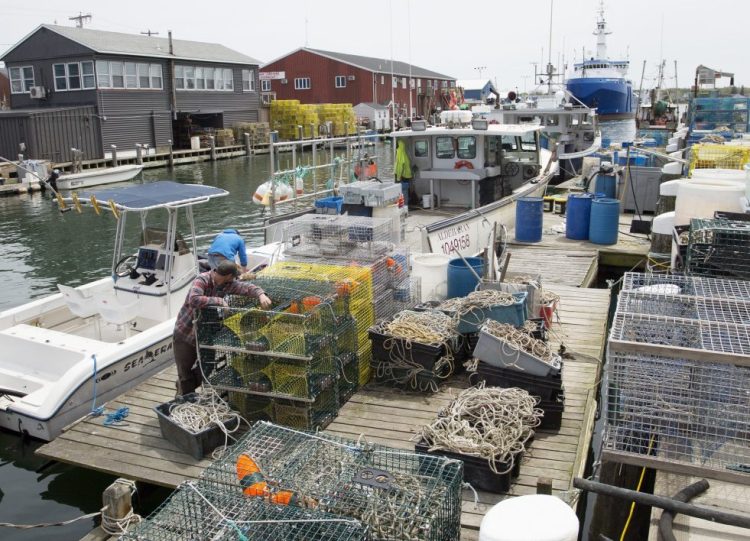A Brunswick-based nonprofit sees a possible development moratorium on Portland’s waterfront as a test case for competing coastal uses in communities across Maine.
“Portland is a bellwether city. Whatever happens in Portland will have a ripple effect across the state,” said Monique Coombs, director of marine programs at Maine Coast Fishermen’s Association, an industry-led group that advocates for inshore fishermen.
The Portland City Council is due to vote Monday on a six-month moratorium on new commercial construction on the water side of Commercial Street, where most of the city’s piers and wharves are.
The construction ban is a response to a citizen referendum that, if passed, would prohibit any waterfront development that did not have a direct water use.
Fishermen fear they are being pushed aside by new development aimed at growing tourism, including a luxury hotel proposed on Fisherman’s Wharf. Pier owners, however, say they are trying to keep the working waterfront alive with cheap berthing fees for fishermen, but need new revenue to pay for expensive wharf upkeep.
The fishermen’s association hasn’t taken a public stance but did support referendum backers with media and organizing help.
Up and down the coast, fishermen, private landowners and developers are debating coastal access, tourism-related development and expanded aquaculture businesses, Coombs said. In Brunswick, water-view homeowners and some lobstermen are battling a proposed oyster farm; a proposal to build a salmon farm in Belfast is dividing that community; and Bar Harbor just concluded a battle over expanding pier access for cruise ships.
Portland’s moratorium, which gives all sides time to address problems with waterfront zoning, enforcement and other issues, may be a good model for other coastal towns and cities, Coombs said.

Joanne Arnold of Falmouth speaks with Stanislav Yurkuvich and Alex Fagan of Portland during a petition drive at Andy’s Old Port Pub on Nov. 11. Fishermen trying to put a question restricting waterfront development on the ballot said they “conditionally support” the city’s moratorium but will continue gathering signatures.
“We think that sets a good precedent for other communities to look at their ordinances and work with fishermen to plan out their future,” Coombs said. “We want a lot of communities to be looking at their working waterfront.”
Fishermen behind the petition drive said Friday they “conditionally support” the moratorium, but will continue gathering signatures until the moratorium passes and the city shows its commitment to solve waterfront problems.
“We look forward to working with the city, wharf owners, and other waterfront merchants to find long-term solutions that will lead to preserving the viability of the working waterfront,” Willis Spear, a lobsterman and lead organizer, said in a written statement. “If it becomes apparent that realistic measures to protect the working waterfront are not moving forward during the moratorium period, we will be back to renew our referendum efforts.”
Petitioners need to get 1,500 signatures by Jan. 18 to put the referendum on the ballot.
Portland City Manager Jon Jennings announced the moratorium Wednesday, along with statements of support from two pier owners. The city wants to avoid a successful referendum that would cement strict zoning rules for five years and deal with lingering concerns about the waterfront central zone. The zone was created in the 1990s to protect the working waterfront from an incursion of condominiums and other construction, but was amended eight years ago to allow more commercial development.
Petitioners “can certainly have faith in the city that once the moratorium is passed on Monday, we’ll get to work right away and start tackling issues that have accumulated over the last several years that will address their concerns and make it work, not just for them but for the pier owners,” Jennings said Friday.
The Portland moratorium is being watched closely in Boothbay Harbor, where organizers are fighting a proposal to rezone part of the town’s maritime zone and allow hotels, restaurants and other tourist-based development. The proposal has split the town between those who encourage investment and economic development and others, like Ken Fitch, who worry a way of life is being dismantled.
“There are similarities to what is happening in Portland and here, just differences in scale,” said Fitch, a spokesman for Friends of the Harbor, a group against the zoning change.
“It is the same principle; you have diminishing waterfront for maritime interests and it is becoming more and more geared toward tourism and hotels,” Fitch said.
“Little by little it is being chipped away,” Fitch said. “It is a little frightening for us; there are really alarm bells for people that we may lose this forever.”
Send questions/comments to the editors.



